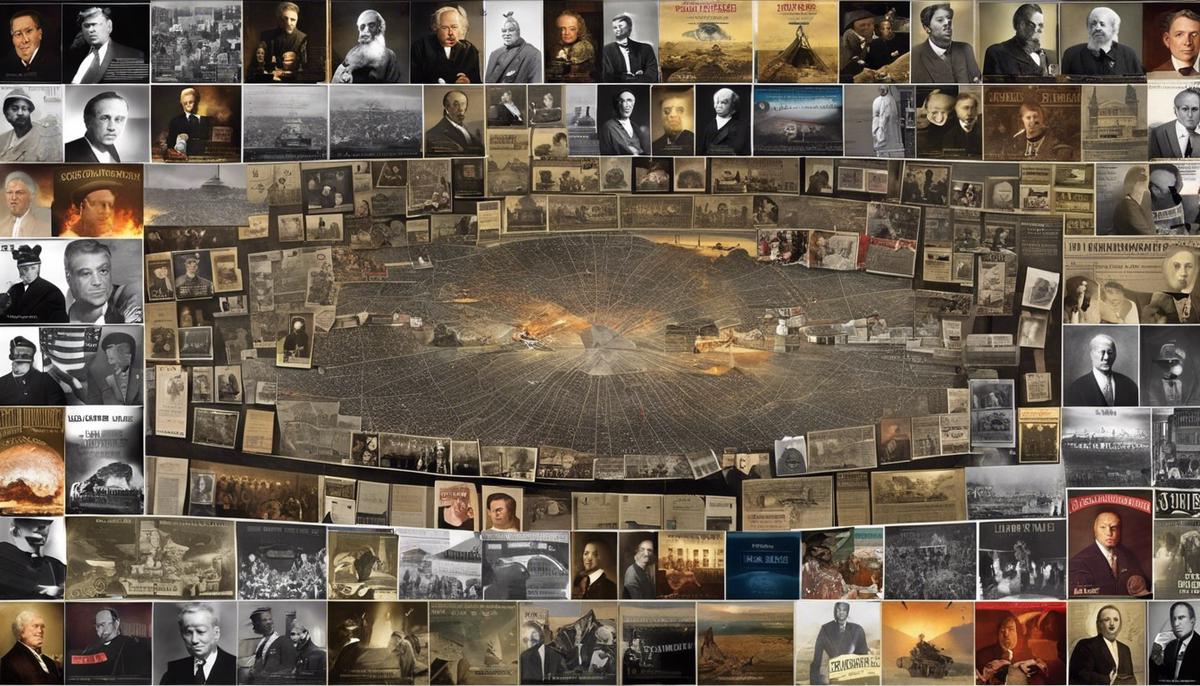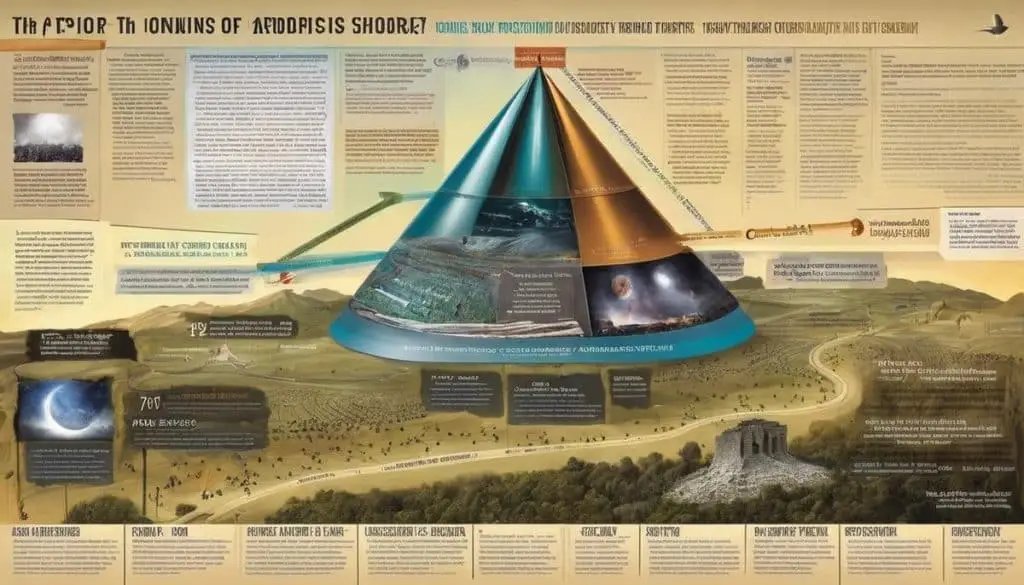Famous American Conspiracy Theories. The world of conspiracy theories is a labyrinth that intertwines fact, fiction, fear, and human psychology; A realm that often reflects the underlying anxieties and uncertainties of society. This exploration delves into the intriguing realm of American conspiracy theories; their beginnings, their impacts on society, the psychology behind them, and their manifestation in the digital age. The origins of conspiracy theories are not standalone, they emerge from the socio-political contexts of their time, fueled by collective anxieties and the spread of misinformation. How these theories, in turn, impact society and influence policy-making, illustrates a cyclical relationship marked by major theories such as Birtherism, the Moon Landing Hoax, and JFK Assassination. Yet, it’s not just society that shapes conspiracy theories; the human psyche plays a significant role. Understanding the cognitive biases, heuristics, and social factors that perpetuate these theories sheds light on their appeal and persistence. Fast forward to the digital age, the manifestation of conspiracy theories has evolved, and their dissemination has reached unprecedented spans.
Origins of Conspiracy Theories
The Evolutionary Trajectory of Notable American Conspiracy Theories
Understanding the historical evolution and cultural influences of prominent American conspiracy theories necessitates an application of interdisciplinary theories from cognitive science, sociology, and political history. This venture explores how these grand narratives of covert control and hidden motives evolve over time and how they affect collective truth-making processes on a societal scale.
The concept of conspiracy theories, a belief that an event or situation is the outcome of a secret, often malevolent plot by a covert group, is not a novel phenomenon in American socio-political history.
From speculations about the assassination of President John F. Kennedy, to the unending debates about the Moon landing in 1969, the trajectory of these theories often mirrors significant cultural, societal, and technological shifts.
The advent of mass media and later the internet has significantly catalyzed these theories’ propagation and evolution. For instance, the rumor about the Roswell incident (1947) gave birth to a multitude of alien conspiracy theories, largely due to the nation’s burgeoning interest in radio communication and space exploration.
A key evolutionary aspect lies in the fundamentals of social epistemology, which studies the nature of knowledge within a socio-cultural context. Conspiracy theories gain traction primarily due to their narrative appeal; they propose a complex, hidden world that challenges mainstream knowledge. They are seductive in their simplicity, providing seemingly logical, yet intricate explanations for otherwise complex realities.
Exploration of conspiracy theories’ trajectory also reveals a significant interplay with political ideologies. A distinct example is the ‘New World Order’ conspiracy, which largely emanates the distrust and apprehension surrounding large governing bodies, reflecting the zeitgeist of anti-globalization sentiments.
Recent innovations in information technology have further influenced the evolution of conspiracy theories. The phenomenon of ‘QAnon’, a contemporary, internet-bred conspiracy theory, landmarks the transition from more traditional, narrative-based theories to digital, non-linear narratives. These digital narratives are proliferated through intricate online networks and are constantly evolving based on the collective input of online communities.
In conclusion, the evolutionary trajectory of American conspiracy theories is intriguingly dynamic and closely interwoven with various societal and technological shifts. It encapsulates Americans’ response to complexities in the political, scientific, and technological landscape. Acknowledging this trajectory enables a more nuanced understanding of our collective decision-making, belief systems, and attempts at truth-making in an increasingly complex world.

Conspiracy Theories and Societal Impact
Conspiracy Theories in America: Societal Dynamics and Public Perception
Diving deeper into the labyrinth of conspiracy theories, it becomes evident that these narratives play a critical role in shaping societal dynamics and public perception through a number of theoretical and empirical pathways. Their impact seeps into the fabric of society, creating divisions, suspicion, and often, a profound mistrust in the power structures that govern lives.
Counter to popular conception, conspiracy theories are not merely confined to the realm of the paranoid or fancifully imaginative. Instead, they serve a substantial function in society that goes beyond mere idle speculation. To apprehend this, one can turn towards the realm of cognitive science for elucidation – specifically, cognitive dissonance and biased assimilation. These psychological theories explain individuals’ attraction to conspiracy theories as a means to reconcile conflicting pieces of information and maintain cognitive consistency.
The theory of cognitive dissonance, introduced by Leon Festinger, posits that humans inherently crave cognitive consistency and go to great lengths to avoid or resolve the discomfort elicited by inconsistent thoughts, beliefs or values. Conspiracy theories act as salient protective mechanisms for the cognitively discomforted.
Similarly, the theory of biased assimilation suggests that people selectively process information in order to validate their pre-existing beliefs and views. Consequently, conspiracy theories take on an almost self-affirming character, as they reinforce and perpetuate themselves within certain societal niches that are ideologically or politically disposed towards them.
From a historical perspective, conspiracy theories have shaped American societal dynamics by catalyzing thought systems and movements that directly challenge existing power hierarchies and the state’s narrative. The Red Scare of the 20th century serves a fitting example where an overarching conspiracy theory, the fear of communist infiltration, fueled by Senator Joseph McCarthy’s allegations, led to a severe societal and political unrest.
Yet, the influence of conspiracy theories extends beyond shaping societal dynamics and weaponizing public fear. They play a significant role in shaping public perception as well, especially regarding controversial events or figures. For instance, the assassination of Martin Luther King Jr. spawned multiple conspiracy theories casting doubts over the officially accepted narrative, therefore restructuring public perception regarding the event.
In conclusion, while enjoying a certain amount of notoriety and mystique, conspiracy theories provide us with opportunities to investigate and understand the human psyche, the interplay between authoritative powers and public trust, and the complex dynamics of societal functioning. Therefore, a rigorous, unbiased study of conspiracy theories not only unveils historical intrigue but significantly contributes to our comprehension of cognitive science, sociology, politics and history.

Psychology Behind Conspiracy Theories
Delving deeper into the ardor of conspiracy theories, it is illuminating to find how this phenomenon interfaces intimately with our cognitive faculties, showcasing perhaps the brain’s inherent proclivity for seeking patterns and ascribing meanings. A crucial aspect of human cognition that fuels conspiracy theories resides in the domain of cognitive psychology dubbed ‘Confirmation Bias’. This principle elucidates the tendency of individuals to seek, interpret, and prioritize information that corroborates their pre-existing beliefs while discrediting, minimizing, or ignoring conflicting evidence. Alas, this pattern-seeking behavior deviates from the objective pursuit of truth as it inclines towards gathering evidence to substantiate certain predetermined convictions.
In the realm of conspiracy theories, this bias operates by engendering an attraction towards alternative explanations of events that resonate with an individual’s prevailing viewpoint. For instance, consider the bias exhibited by individuals leaning towards anti-establishment sentiments, which may make conspiracy theories that frame governmental or institutional structures as malign and manipulative more appealing to them.
In parallel, ‘Cognitive Dissonance’, another underlying psychological principle detailing the discomfort experienced by individuals when they are confronted with conflicting information, further fans the flames of conspiracy theories. When presented with reality contradictory to their belief systems, this theory argues that individuals are motived to alleviate this discrepancy by rejecting or rationalizing away the unsettling reality. Conspiracy theories, by providing alternative narratives that align with an individual’s worldview, can serve as efficient salves to alleviate cognitive discomfort, acting as psychological armor against distressing truths.
The allure of conspiracy theories is furthermore magnified by their self-sealing nature. Conspiracy theories inherently dismiss disconfirming evidence as part of the conspiracy, thereby rendering them immune to factual counter-arguments. This feature can catalyze an almost impenetrable belief system that reinforces itself by discrediting any threat.
On a sociological level, noteworthy is the sheen of empowerment that conspiracy theories promise to communities that feel disenfranchised or mistrustful of authoritative narratives. As symbols of dissenting undercurrents, they serve to challenge existing power hierarchies and state-sanctioned narratives, offering alternate, albeit often misleading, pathways towards perceived truth.
Moreover, conspiracy theories can exacerbate societal sectarism, inciting suspicion and discord among the populace. A premise often utilized is that of an ‘in-group’ privy to the ‘real truth’ versus an ‘out-group’ assumed to be part of the conspiracy or complacently oblivious to it. This dynamic engenders cohesion within the conspiracy-believing in-group, whilst fostering tension and animosity between the in-and-out groups.
In conclusion, when attempting to unravel the mesmeric spell that conspiracy theories cast upon the human psyche, a multifaceted, interdisciplinary understanding is imperative, incorporating cognitive psychology, sociology, political theory, and historical context. Grappling with this intricate web is challenging, yet is vital to unravel the escalating tide of misinformation that characterizes our contemporary era. The surging propagation of these alternate narratives in the digital age underscores the urgency of comprehending the psychological mechanisms at play. This is incumbent upon us to foster a society that values critical thinking, empathy, and objectivity, guiding our collective endeavor to navigate towards truth.

Conspiracy Theories in the Digital Age
The Relationship Between Cognitive Faculties and Conspiracy Theories
The seeds of conspiracy theories often find convenient ground in the cognitive imperfections that are an intrinsic component of human psychology. An insightful sojourn into this terrain illuminates a few key cognitive biases that facilitate the perpetuation of conspiracy theories.
Foremost, the principle of ‘confirmation bias’, a ubiquitous phenomenon contributes substantially. It posits that humans have a proclivity to seek out, interpret, and recollect information that affirm pre-existing beliefs. In the realm of conspiracy theories, confirmation bias can foster an environment where selective facts are overemphasized, and disconfirming evidence is conveniently overlooked, further solidifying the belief system.
Next, the ‘cognitive dissonance’ theory, articulated by Leon Festinger observes that individuals strive to circumvent the discomfort experienced when holding conflicting cognitions. As applied to conspiracy theories, individuals may alloy unacceptable realities with conspiracist hypotheses, thereby reducing cognitive dissonance.
The Self-sealing nature and Empowerment in Conspiracy Theories
Conspiracy theories inherently possess a self-sealing nature. Any evidence refuting the theory is construed as a deliberate effort to obfuscate ‘the truth’, thereby making the theory impervious to critical evaluation. The propensity of conspiracy theories to provide simplistic explanations for complex phenomena also tend to evoke a sense of empowerment among believers, often a reaction to feelings of disenfranchisement.
Division Sown by Conspiracy Theories and the Need for Multi-disciplinary Approach
The fostering of conspiracy theories in societal niches can lead to profound sectarianism, fostering division, and amplifying existing socioeconomic discrepancies. The polarized realities, further complicated by the echo-chamber effect of social media platforms, exacerbate social discord.
Therefore, untangling the intricate web of conspiracy theories and their influence on societal dynamics calls for a multi-disciplinary approach that encapsulates cognitive science, sociology, politics, and history. It necessitates an approach that can decipher the complex interplay between psychological propensities, sociopolitical events, information dissemination, and the architecture of beliefs.
The Way Forward: Promoting Critical Thinking, Empathy and Objectivity
In the battle against misinformation and divisive conspiracies, fostering critical thinking lies at the foundation. Encouragingly, pedagogical methods promoting, discernment, skepticism, and the scientific method have shown promising results.
Moreover, fostering ’empathy’ towards those swayed by conspiracy theories can help tweedled the cycle of distrust and alienation. This rests on understanding that believing in conspiracy theories isn’t proof of an illogical mind, but rather a reflection of complex psychological, societal, and cultural influences.
Lastly, maintaining objectivity, especially in the age of personalized digital realities, is both a challenge and a necessity. An environment cultivating objectivity can equip individuals to be resistant to the lure of misinformation and sensationalist hypotheses, thereby reinforcing the societal fabric against the errant threads of conspiracy theories.

Photo by markuswinkler on Unsplash
Unraveling the intriguing world of conspiracy theories is like stepping into a transformational mirror of society, a reflection warped by fears, anxieties, and tactical misinformation. Early origins give way to societal impacts, showing the cyclical nature of conspiracy theories and the way they can shape and be shaped by their contexts. Yet, it’s not just a cycle; it’s a constant evolution, especially in the digital age. The stories change, the times change, and so does the arena. The psychological foundations, however, remain, providing a lens to understand why these theories continue to grip individuals and societies. As we move forward in this digital age, marked by the rise of phenomena like QAnon and Pizzagate, the understanding of these factors becomes even more crucial. It shapes the narrative of our times, providing a guide to navigate the maze of misinformation, collective anxiety, and ultimately, the truth.
Steve is the creative force behind My Unique Tales, a blog dedicated to sharing captivating stories that explore the human experience in all its complexity. With a passion for writing and a talent for crafting engaging narratives, Steve's blog is a treasure trove of imaginative tales that transport readers to other worlds and challenge them to see things from new perspectives. From epic adventures to intimate character studies, Steve's stories are always thought-provoking and emotionally resonant. With a growing following of readers who appreciate his unique voice and creative vision, Steve is quickly becoming a rising star in the world of online storytelling.






